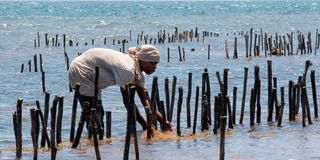
A seaweed farmer plants the cuttings of the weed, used to make cosmetic products, at an open beach in the Indian Ocean within the Kibuyuni village in Kwale county on October 21, 2024.
This week, a powerful wave of global leadership surged into Busan, South Korea, as the world’s most dedicated ocean champions gathered for the landmark 10th edition of the Our Ocean Conference (OOC), united under the theme: “Our Ocean, Our Action.”
Marking a decade of unwavering commitment and collaboration, this milestone event called for nothing less than a transformative shift - from viewing our seas as an “ocean in crisis” to embracing them as an “ocean of hope.” It is a call to harness innovation, inclusivity, and the best of science to rewrite the future of ocean governance, ensuring that the blue heart of our planet thrives for generations to come.
And we know this to be true: Humanity’s survival depends on a healthy ocean. It is responsible for around half the world’s oxygen, absorbs more than 90 per cent of excess heat caused by human activity, and captures roughly 25 per cent of global carbon dioxide emissions. It is a vital food source for over three billion people and supports millions of livelihoods globally. In Kenya alone, the blue economy could inject over $4.8 billion into the economy and generate more than 52,000 jobs over the next decade - if harnessed wisely. The ocean’s natural infrastructure like mangroves, seagrasses, and kelp forests not only captures carbon but also buffers our coastlines from rising seas and storms.
At the heart of the vision of OOC lies an urgent mission: to fast-track the implementation of groundbreaking global agreements that promise to safeguard our marine heritage. Among these are the historic UN Treaty on Plastic Pollution, a beacon of hope against the tide of marine debris, and the Biodiversity Beyond National Jurisdiction (BBNJ) Treaty, which aims to protect the vast, mysterious 61 per cent of our oceans that lie beyond any single nation’s borders. Together, these agreements represent a new era of cooperation and responsibility, where the health of our oceans is recognised as a shared, sacred heritage.
Catalyst for action
Adding to the conference’s significance, Kenya was officially announced as the host for the 2026 Our Ocean Conference - a historic moment that will bring this global gathering to African shores for the very first time. It signals a new chapter where African voices, wisdom, and priorities will take centre stage, enriching the global ocean movement with fresh perspectives and informed solutions. As the world looks ahead, the 2026 conference in Kenya promises to be a catalyst for action, inspiring all of us to protect and cherish the boundless blue that sustains life on Earth.
It could not be happening at a more critical time, or in a more crucial region. Africa is home to over 30,000 kilometres of coastline and 38 coastal and island states. From the vibrant fisheries of West Africa to the deepwater ecosystems of the Indian Ocean, our continent’s relationship with the ocean is foundational to our economies, our histories, our cultures, and our climate resilience. Yet the challenges we face are intensifying, and the opportunity to lead with vision has never been greater.
Off the southern coast of the continent, the Great African Seaforest, home to the world’s only giant bamboo kelp, offers a powerful symbol of marine resilience in the face of climate change. These ecosystems are Africa’s first line of defence against climate change, yet they remain undervalued and under threat. Protecting and restoring these ecosystems is not just good environmental policy - it’s smart development strategy.
Marine biodiversity
However, the ocean itself is sounding the alarm. In 2024, we recorded the hottest ocean temperatures in history. Oxygen levels are dropping, and acidification is accelerating at a rate not seen in 26,000 years. And it’s projected that by 2050 there could be more plastic in our seas than fish. The Our Ocean Conference has become one of the most impactful global convenings for marine action. Over the past decade, it has inspired more than 2,600 commitments worth approximately $160 billion.
In the lead-up to OOC Kenya, several pivotal processes will shape the global ocean landscape. The aforementioned BBNJ Agreement - a landmark agreement to safeguard marine biodiversity beyond national jurisdiction - requires 60 ratifications to enter into force. So far, only 21 countries have done so, and only three are African: Malawi, Mauritius, and Seychelles. An astonishingly small number for the crucial role Africa must play in shaping high seas governance.
Secondly, The Global Biodiversity Framework, which has a target among others, to protect 30 per cent of marine and terrestrial ecosystems by 2030 (“30 by 30”), is also gaining momentum but to date only 8.5 per cent of our ocean is protected.
Hosting OOC in 2026 is more than a symbolic gesture. It’s a call to action. It’s an opportunity to ensure African priorities are reflected in global decisions.
Wanjira Mathai is the MD for Africa & Global Partnerships at the World Resources Institute and Chair of the Wangari Maathai Foundation







